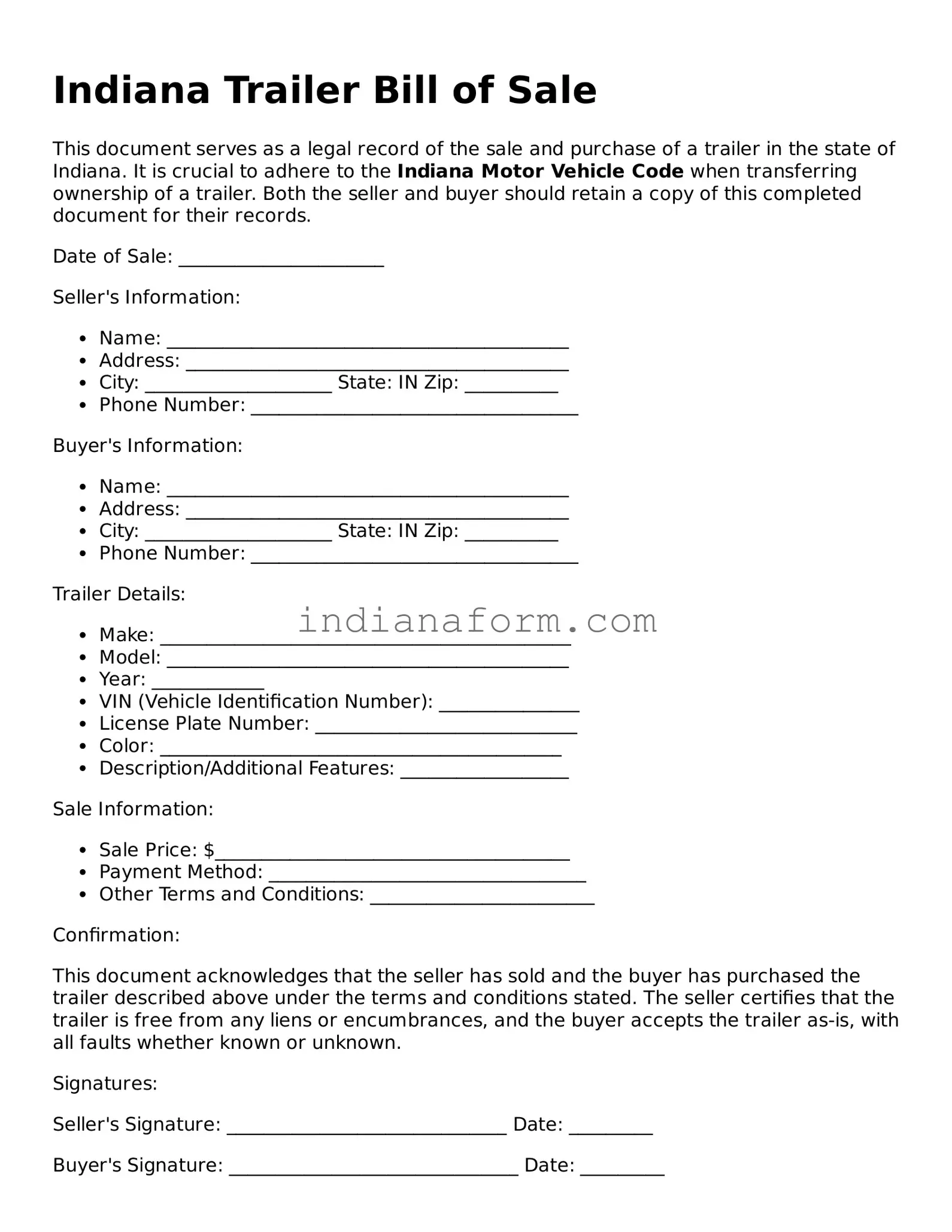What is a Trailer Bill of Sale form in Indiana?
A Trailer Bill of Sale form in Indiana is a legal document that provides evidence of the sale and transfer of ownership of a trailer from the seller to the buyer. This form typically includes details such as the trailer's description, the sale price, and the names and signatures of the parties involved.
Why do I need a Trailer Bill of Sale in Indiana?
In Indiana, a Trailer Bill of Sale serves as a crucial record of the transaction that took place. It can be used for legal and registration purposes, proving ownership and facilitating the process of registering the trailer with the Indiana Bureau of Motor Vehicles (BMV). It also provides buyers and sellers with legal protection in case of disputes or questions about the trailer’s ownership in the future.
What information should be included in a Trailer Bill of Sale?
A comprehensive Trailer Bill of Sale should include the following information: the date of the sale, the names and addresses of the buyer and seller, a detailed description of the trailer (including make, model, year, and Vehicle Identification Number (VIN)), the sale price, and the signatures of both parties involved in the transaction. It’s also advisable to include any warranties or disclosures related to the trailer’s condition.
Is a Trailer Bill of Sale required for registration in Indiana?
While not always mandated for all types of trailers, having a completed Trailer Bill of Sale can be incredibly helpful and, in some cases, necessary for registration purposes in Indiana. It acts as a proof of purchase and ownership, which can streamline the registration process at the BMV.
Do I need to notarize the Trailer Bill of Sale in Indiana?
Indiana does not require the notarization of a Trailer Bill of Sale for it to be considered valid. However, choosing to notarize the document can add an extra layer of legitimacy and may be beneficial in preventing legal complications or disputes about the validity of the signatures or the sale itself.
Can I create a Trailer Bill of Sale by myself?
Yes, individuals can create their own Trailer Bill of Sale. It is important, however, to ensure that the document includes all of the necessary information to be considered valid and effective for legal or registration purposes. Templates or forms available online can serve as a helpful guide.
What happens if I lose my Trailer Bill of Sale?
If the Trailer Bill of Sale is lost, it's advisable to contact the buyer or seller to see if they possess a copy. If a copy is not available, drafting a new document and having both parties sign it again can serve as a replacement. Keeping digital copies of such documents can prevent this issue in the future.
Is a Trailer Bill of Sale enough to prove ownership in Indiana?
A Trailer Bill of Sale is an important document that can prove ownership, but in the context of registration with the Indiana BMV, additional documents might be required. These documents might include a Certificate of Title or a Manufacturer’s Statement of Origin, along with the Trailer Bill of Sale, to successfully register the trailer.
Can I use a generic Trailer Bill of Sale form for a transaction in Indiana?
Yes, a generic Trailer Bill of Sale form can be used for a transaction in Indiana as long as it includes all the necessary information to accurately reflect the sale and transfer of ownership of the trailer. It is critical, however, to ensure that the form complies with Indiana state requirements.

